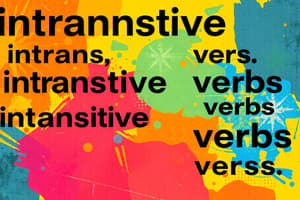Podcast
Questions and Answers
What is the primary function of modal verbs?
What is the primary function of modal verbs?
- To create passive voice sentences.
- To express possibilities, permission, or certainty. (correct)
- To modify adjectives or adverbs.
- To form continuous tense structures.
Which of the following is NOT categorized as an adverb of time?
Which of the following is NOT categorized as an adverb of time?
- Soon
- Here (correct)
- After
- Ago
In the sentence 'He could have stopped them,' what function does the modal 'could' serve?
In the sentence 'He could have stopped them,' what function does the modal 'could' serve?
- To express obligation.
- To indicate past ability. (correct)
- To show future certainty.
- To make a request.
How do adverbs of place function in a sentence?
How do adverbs of place function in a sentence?
Which of the following sentences correctly uses an adverb of degree?
Which of the following sentences correctly uses an adverb of degree?
What role do auxiliary verbs play in forming sentences?
What role do auxiliary verbs play in forming sentences?
Which of the following is an example of an adverb of frequency?
Which of the following is an example of an adverb of frequency?
In the example 'You do look great,' what type of auxiliary is 'do' functioning as?
In the example 'You do look great,' what type of auxiliary is 'do' functioning as?
Which type of numeral adjective denotes how many?
Which type of numeral adjective denotes how many?
Which of the following is an example of an indefinite numeral adjective?
Which of the following is an example of an indefinite numeral adjective?
What do distributive numeral adjectives refer to?
What do distributive numeral adjectives refer to?
Which adjective is used to express ownership?
Which adjective is used to express ownership?
Which type of adjective is used to ask questions?
Which type of adjective is used to ask questions?
An example of an emphasizing adjective is:
An example of an emphasizing adjective is:
Which term is specifically used for exclamatory adjectives?
Which term is specifically used for exclamatory adjectives?
Which adjective points to a specific item?
Which adjective points to a specific item?
Which verb types can be converted from Active Voice to Passive Voice?
Which verb types can be converted from Active Voice to Passive Voice?
Which of the following sentences contains an intransitive verb?
Which of the following sentences contains an intransitive verb?
What term describes verbs that refer back to the same subject and direct object?
What term describes verbs that refer back to the same subject and direct object?
Which of the following is NOT an example of an auxiliary verb?
Which of the following is NOT an example of an auxiliary verb?
Which of the following sentences demonstrates a reflexive verb?
Which of the following sentences demonstrates a reflexive verb?
Which verb forms an action that cannot be done to anything or anyone?
Which verb forms an action that cannot be done to anything or anyone?
Which sentence uses 'walked' as a transitive verb?
Which sentence uses 'walked' as a transitive verb?
Which of the following verbs can be used both transitively and intransitively?
Which of the following verbs can be used both transitively and intransitively?
Which of the following terms refers to a group of words functioning as a single preposition?
Which of the following terms refers to a group of words functioning as a single preposition?
What characterizes Participle Prepositions?
What characterizes Participle Prepositions?
Which example illustrates the use of a Compound Preposition?
Which example illustrates the use of a Compound Preposition?
Which of the following is an example of a Disguised Preposition?
Which of the following is an example of a Disguised Preposition?
Which of the following options consists of Phrasal Prepositions?
Which of the following options consists of Phrasal Prepositions?
What is a key feature of Compound Prepositions?
What is a key feature of Compound Prepositions?
Which of the following is NOT a characteristic of Participle Prepositions?
Which of the following is NOT a characteristic of Participle Prepositions?
Which of the following sentences correctly uses a Phrasal Preposition?
Which of the following sentences correctly uses a Phrasal Preposition?
What is the primary function of subordinating conjunctions of concession?
What is the primary function of subordinating conjunctions of concession?
Which of the following is an example of a subordinating conjunction of comparison?
Which of the following is an example of a subordinating conjunction of comparison?
Which type of interjection is used to express emotions of warmness when meeting someone?
Which type of interjection is used to express emotions of warmness when meeting someone?
What punctuation mark is typically associated with interjections?
What punctuation mark is typically associated with interjections?
Which of the following interjections indicates surprise?
Which of the following interjections indicates surprise?
In which situation would you use an interjection for approval?
In which situation would you use an interjection for approval?
How do subordinating conjunctions of concession affect the main clause?
How do subordinating conjunctions of concession affect the main clause?
Which interjection could be used to express urgency and draw attention?
Which interjection could be used to express urgency and draw attention?
Flashcards are hidden until you start studying
Study Notes
Transitive Verbs
- A transitive verb has a direct object
- Sentence containing a transitive verb can be converted from active voice to passive voice
- Example: The batsman hit the ball hard.
- The ball was hit hard by the batsman (passive voice)
Intransitive Verbs
- An intransitive verb does not have a direct object.
- Sentences containing an intransitive verb cannot be converted to a passive voice.
- Example: The lion cub sleeps. (The verb "sleeps" does not have a direct object.)
Reflexive Verbs
- Reflexive verbs have the same subject and direct object.
- The subject performs the action on itself.
- Example: She stays home herself. (The subject "She" is the same as the object "herself".)
Auxiliary Verbs
- Auxiliary verbs help the main verb in a sentence.
- They are also called helping verbs.
- They help change tenses, mood, or voice of a sentence.
- Examples: is, am, are, was, were, have, do, etc.
Modal Verbs
- Modal verbs are used before ordinary verbs to indicate possibility, permission, certainty, etc.
- Common modal verbs: can, could, may, might, will, would, shall, should, must, ought.
- Modal verbs are often considered a type of auxiliary verb.
Adverbs
- Adverbs modify verbs, adjectives or other adverbs.
- They give further information about the manner, place, time, or degree of an action, quality, or circumstance.
- Example: Ali walks swiftly. (The adverb "swiftly" modifies the verb "walks" and tells us the manner in which Ali walks.)
Types of Adverbs
- Adverbs of Time: Tell us when an action occurred (example: ago, before, after, now, never).
- Adverbs of Place: Tell us where an action occurred (example: here, there, everywhere).
- Adverbs of Frequency: Tell us how often an action occurred (example: always, sometimes, never).
- Adverbs of Degree: Tell us the extent or intensity of an action (example: very, extremely, quite).
- Adverbs of Manner: Tell us how an action was performed (example: slowly, quickly, carefully).
- Adverbs of Reason: Tell us why an action occurred (example: because, since, therefore).
- Relative Adverbs: Connect dependent clauses to independent clauses (example: where, when, why).
- Interrogative Adverbs: Used to ask questions (example: how, when, where).
- Adverbs of Affirmation and Negation: Express certainty or uncertainty, agreement or disagreement (example: yes, no, certainly, perhaps).
Types of Adjectives
- Demonstrative Adjectives: Point to a specific person or thing (example: this, that, these, those).
- Interrogative Adjectives: Used to ask questions (example: what, whose, which).
- Possessive Adjectives: Show ownership (example: my, your, his, her).
- Emphasizing Adjectives: Emphasize a noun (example: very, own).
- Exclamatory Adjectives: Express strong emotion (example: what).
Types of Prepositions
- Simple Prepositions: Single words (example: on, in, at, with, to, from, etc.).
- Double Prepositions: Two simple prepositions together (example: from under, up to, etc.).
- Compound Prepositions: Formed by adding a prefix to a root word (example: about, across, behind).
- Phrasal Prepositions: Groups of words acting as a single preposition (example: in spite of, according to, etc.).
- Participle Prepositions: Present participles used as prepositions (example: concerning, considering, notwithstanding, etc.).
- Disguised Prepositions: Shortened forms of other prepositions (example: "a" for "on" and "o" for "of").
Subordinating Conjunctions
- Subordinating Conjunctions of Concession: Concede a fact or idea regardless of the main clause.
- Subordinating Conjunctions of Comparison: Show comparison between two things.
Interjections
- Interjections are words or phrases that express emotions.
- They are always used with an exclamation mark(!).
- Examples: Hurrah!, Alas!, Oh no!, Oh my God!, What!, etc.
Types of Interjections
- Greeting: Expressing warmth (example: Good Morning!, Hello!, Hey!).
- Happiness: Expressing joy (example: Yeah!, Hurrah!, Wow!).
- Attention: Drawing attention (example: Hey!, Yo!, Look!, Listen!).
- Approval: Expressing agreement (example: Well done!, Brilliant!).
- Surprise: Expressing astonishment (example: Oh!, Wow!).
- Disappointment: Expressing sadness (example: Oh no!, Alas!).
- Anger: Expressing frustration (example: Ugh!, Gosh!).
Studying That Suits You
Use AI to generate personalized quizzes and flashcards to suit your learning preferences.




